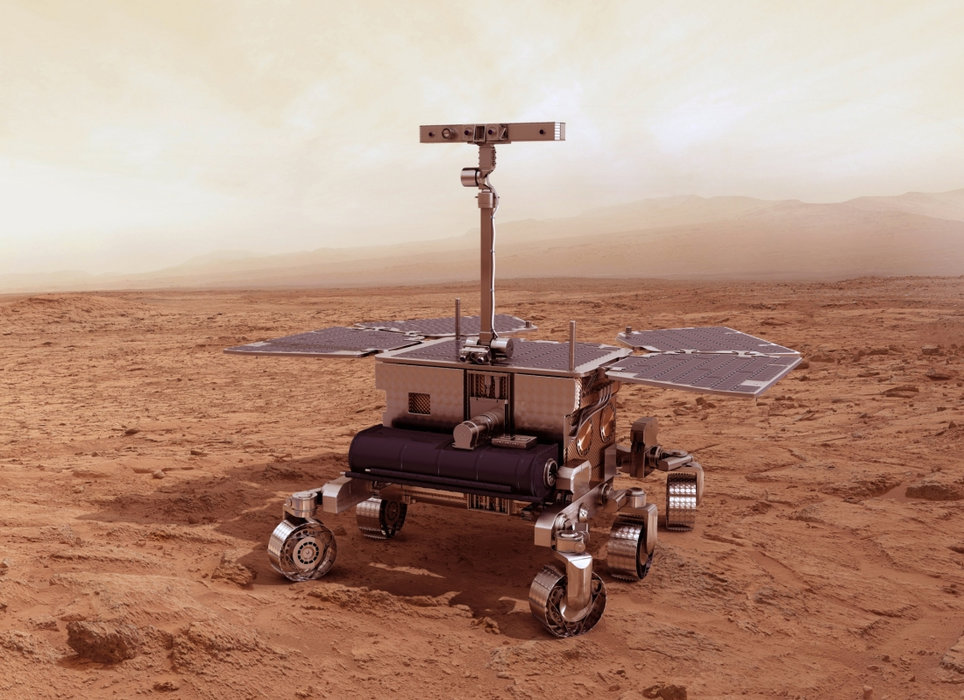Mission to Mars: to be continued!
Thales Alenia Space contributes expertise to the study of an international Mars Sample Return mission

Thales Alenia Space, a joint company between Thales (67%) and Leonardo (33%), announced today that it has signed two study contracts* with the European Space Agency (ESA) in the frame of a joint ESA-NASA study on an international Mars Sample Return mission. This latest mission to the Red Planet is designed to bring samples from the surface of Mars back to Earth. It represents a major new step forward in our exploration of the Solar System, its formation, and especially in our study of Mars and questions about its possible habitability.
Although not that far from Earth within our Solar System, Mars is very different from our own planet, especially with temperatures ranging from a high of 27°C to a low of -133°C. However, there are still several similarities, including a day that is comparable to our 24-hour day and the presence of seasons. Life on Mars cannot be definitely excluded, given that water has already flowed on its surface, and minerals that only form in the presence of water have been discovered.
The ExoMars probe built by Thales Alenia Space was launched in 2016 to detect any traces of life on Mars. The follow-up to this program is planned for 2020.
With the ExoMars program continuing, ESA is also working closely with American counterpart NASA on studying concepts for a new international mission, namely Mars Sample Return. Within this study, ESA is specifically in charge of the Earth Return Orbiter (MSR-ERO) and the Sample Fetch Rover (MSR-SFR).
Thales Alenia Space, as prime contractor for these aspects, will define the overall architecture and preliminary design for MSR-ERO and the MSR-SFR. It will also be in charge of characterizing the main equipment involved, to be subsequently supplied by a European industrial consortium.
With its major role on the ExoMars mission, which should enable Europe to land on Mars in 2020 to continue the search for traces of life, Thales Alenia Space is contributing its expertise and resources to support the upcoming discoveries that will allow us to better understand the Red Planet and prepare future human missions to Mars.
- Sample Fetch Rover (MSR-SFR) / Recover samples on Mars
- Earth Return Orbiter (MSR-ERO) / Capture these samples in Mars orbit and return them to Earth
The Mars Sample Return mission is designed to send a spacecraft (MSR-ERO) into orbit around Mars, with a lander (MSR Sample Retrieval Lander) that will descend to the planet’s surface. The lander will carry the SFR that will collect the samples that have been cached by the NASA Mars 2020 rover from the Martian surface. The SFR will transfer these samples into a mini-rocket (Mars Ascent Vehicle, developed by NASA), which will launch them into Mars orbit. Once the samples have been located and captured by the ERO spacecraft, the samples will then be sealed in a biological containment system to prevent any contamination of Earth by this non-sterilized matter, and placed inside an Earth Entry Vehicle. ERO will then leave Martian orbit and head back to Earth. When it arrives back in Earth orbit, it will jettison the Earth entry vehicle with the samples, and they will be recovered back on terra firma and analyzed. Three launches will be needed for this mission: a first launch in 2020 for a rover to collect the samples of soil in different locations, a second launch for landing the SFR for delivery of the samples to the Mars Ascent Vehicle and a third one specific for the Orbiter.
* Phase A/B1 studies: These two studies include the conceptual analysis of equipment to guarantee mission feasibility, define a reference baseline for the rover and orbiter and its subsystems, and define the development phases.
About ExoMars
Thales Alenia Space is in charge of the entire design phase for the two ExoMars missions (2016 & 2020), leading a European industrial consortium. For the 2016 mission, Thales Alenia Space produced the Schiaparelli entry and descent module (EDM), as well as the Trace Gas Orbiter (TGO), still in orbit around Mars and performing scientific readings of the Martian atmosphere. For the 2020 mission, Thales Alenia Space is in charge of overall system design, development of the navigation and guidance system, and the rover entry, descent and landing system; it also supplies basic parts such as the radar altimeter. Thales Alenia Space is working with OHB (Carrier Module) and Airbus Defense and Space UK (Rover Module) on this program. The 2020 mission is now at an advanced state of development. Some of the equipment for the descent module will be delivered this year, followed by the carrier module and the rover, so that spacecraft integration can be completed for a launch now planned between July 25 and August 13, 2020.
About Thales Alenia Space
Drawing on over 40 years of experience and a unique combination of skills, expertise and cultures, Thales Alenia Space delivers cost-effective solutions for telecommunications, navigation, Earth observation, environmental management, exploration, science and orbital infrastructures. Governments and private industry alike count on Thales Alenia Space to design satellite-based systems that provide anytime, anywhere connections and positioning, monitor our planet, enhance management of its resources, and explore our Solar System and beyond. Thales Alenia Space sees space as a new horizon, helping to build a better, more sustainable life on Earth. A joint venture between Thales (67%) and Leonardo (33%), Thales Alenia Space also teams up with Telespazio to form the parent companies’ Space Alliance, which offers a complete range of services. Thales Alenia Space posted consolidated revenues of 2.6 billion euros in 2017 and has 7,980 employees in nine countries.
www.thalesaleniaspace.com

